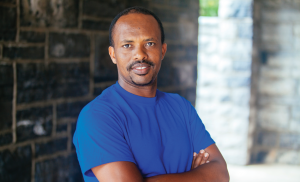
Jean Claude Nkundwa, MA ’14, thought finding work in peacebuilding in his native Burundi after graduation could take up to two years. When, he, his wife Francine Muhimpundu, and young son returned, Nkundwa renewed former contacts from working 12 years with partner organizations affiliated with Mennonite Central Committee and also with Harvest of Peace Ministries. With Burundi International Community Church, he helped mobilize churches in community violence prevention training and began building an early warning system network
However, his patient plan was sidetracked by a May 2015 political crisis, one which Nkundwa presciently predicted the month before in a New York Times op-ed titled “Burundi: On the Brink?”
The coup was precipitated by the decision of President Pierre Nkurunziza to run for a controversial third term. Since his win in the election, hundreds of people have been killed and more than a quarter of a million people have fled the country. Human rights abuses are rampant.
“That article helped get my name out,” Nkundwa said. When he fled to Rwanda with his family and other civil society leaders, he was quickly back on his feet. With former classmate Katrina Gehman, MA ’15, he published a conflict analysis that opened doors to his inclusion in gaining support of leaders in Uganda, Ethiopia, South Africa and Tanzania for peace talks.
Nkundwa says the strategic peacebuilding and negotiation practices taught at CJP have contributed to a unique skill set: “CJP taught me to think about who to build relationships with, how to work with influential individuals and groups who can facilitate your messages. As someone who works independently, that is one of my biggest skills. Now I support civil society groups in analysis, suggesting interventions, framing messages, targeting allies, networking and process.”
From exile in Rwanda, Nkundwa is being called upon to help peace negotiations forward and to advocate for international intervention to prevent a situation that could turn swiftly to genocide, once again. In May, he was invited by Crisis Action to advocate before the United Nations Security Council with representatives of Burundi’s civil society for police intervention to protect civilians.
Disturbed by the lack of consensus among mid-level security council members, he then scheduled a series of meetings, facilitated by a U.S.- based student peace organization, in Washington D.C. with staff of Special Envoy for the Great Lakes Region of Africa Tom Perriello in the U.S. Department of State. He also met with the United States Senate and U.S. House committees on foreign relations, representatives of USAID, and non-governmental organization advocates.
He also visited Gehman, now an independent contractor for the U.S. Army Peacekeeping and Stability Operations Institute, and met with military officials to highlight that “without civilian protection, political solutions are not possible.”
At SPI, during his final week in the United States, Nkundwa took Lisa Schirch’s course on peacebuilding approaches to violent extremism in anticipation, he says, of what is likely to occur in Burundi.
Despite concerns about his future, Nkundwa was pleased to be back at EMU. “Always moving from one emergency to another and constantly adapting leadership skills and language is exhausting. I needed a break. This has been a good time to reflect. I’ve taken some good deep breaths here,” he said with a laugh.
Invaluable, too, was the encouragement of fellow peacebuilders. “My colleagues in other countries dealing with similar issues have listened, counseled and criticized,” he said. “My own understanding of my situation and of what is happening in Burundi needed to be checked. Here is a space to which I can bring my assessments and the way I think things should be done, so my colleagues can help me develop the most clear analysis and the best strategies to suggest when I return.”